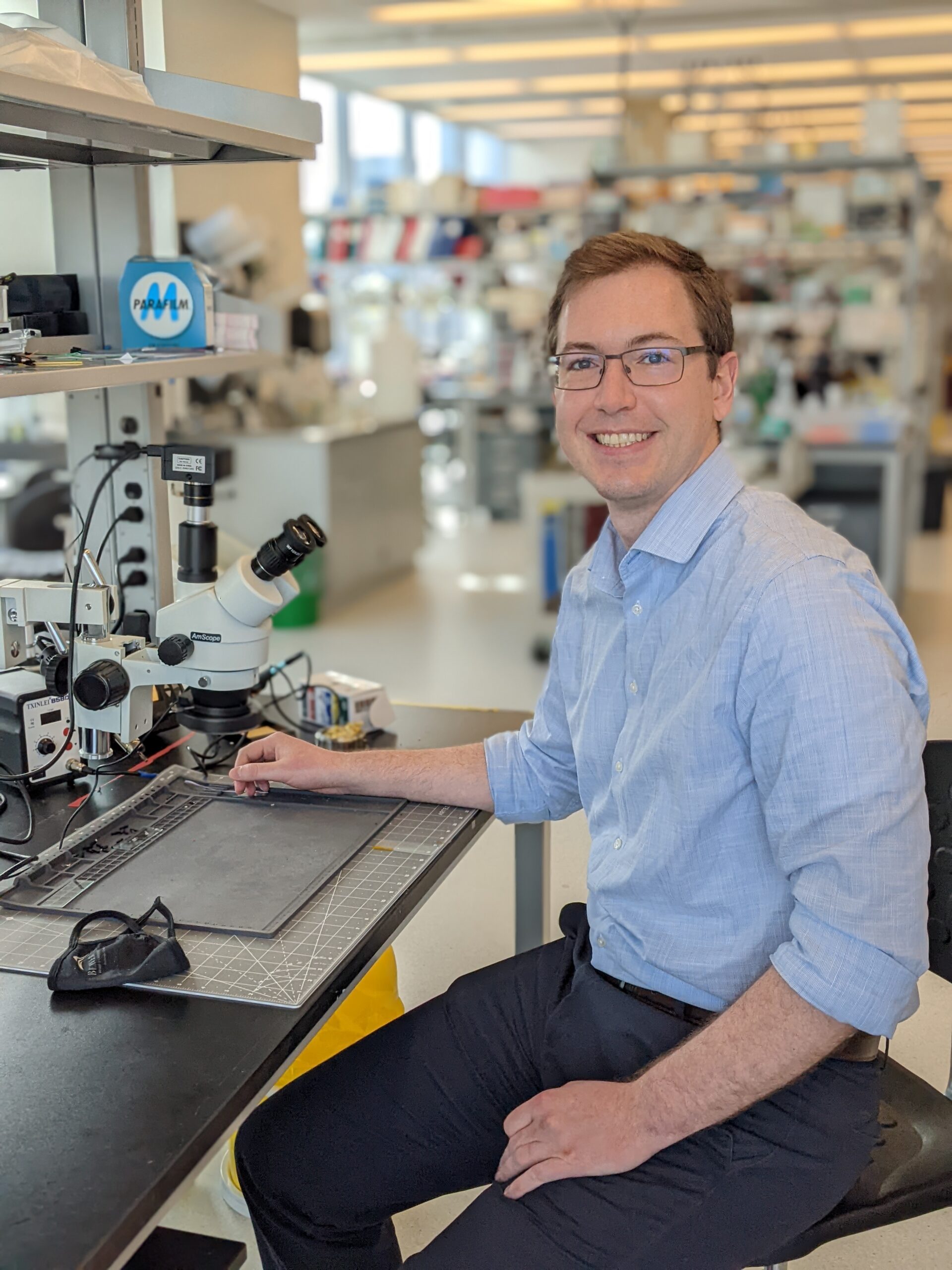University of Toronto Strategic Initiative awards $150K towards innovative heart failure research
TRANSFORM HF is pleased to announce the winners of our inaugural Seed Grant competition! Congratulations to Jennifer Gibson (Associate Professor, Institute of Health Policy, Management, and Evaluation at Dalla Lana School of Public Health), Dan Franklin (Assistant Professor, Institute of Biomedical Engineering at the Faculty of Applied Science and Engineering), and Aaron Wheeler (Professor, Department of Chemistry in the Faculty of Arts and Science).
These Seed Grants, valued at $50,000 each, are meant to encourage, foster, and support members of the TRANSFORM HF community working collaboratively on research and project proposals that align with our vision. “All three of the supported projects promise to improve equitable access to heart failure care through innovative technologies and models of care, capturing all that we strive for in TRANSFORM HF,” said co-lead Craig Simmons. “We are delighted to support these researcher’s outstanding projects.”
The competition was open to investigators affiliated with TRANSFORM HF and the University of Toronto and/or the institutions within the Toronto Academic Health Science Network.
In addition to addressing inequities in heart failure care, proposals were required to incorporate considerations of sex and gender-based analysis and reporting; patient and community engagement; Indigenous knowledge and research methods; and equity, diversity, and inclusion. The review panel consisted of clinicians, engineers, trainees, and patient partners to ensure that all perspectives were considered in evaluation.
Seed Grant Winners

Dr. Gibson’s research aims to develop a new care program for the management of heart failure in persons experiencing homelessness. She and her team will work in partnership with community organizations to co-design and test a new care program, providing valuable insight into the way shelters, community health centres, outreach teams, and hospitals provide cardiac management for this population. “We are building a diverse community of people who want to improve the heart health of people experiencing homelessness, and it is being driven by persons with lived experience,” said Gibson. “We are honoured to grow and learn with TRANSFORM HF and are thankful for this Seed Grant, which is supporting the doctoral research of Jillian Macklin. This project was made possible by her leadership, as well as by the contributions of her peer-researchers and the support of her other committee members Heather Ross and Andrew Pinto.”
Recent studies have shown that pulse oximetry, a monitoring tool used to track patients’ vitals and status, is three times more likely to misread vitals in dark-skin patients than light-skin patients. This can potentially lead to at-risk patients being overlooked for care. “As wearable health devices become more widespread, we are excited to partner with TRANSFORM HF to ensure they function equally for all Canadians,” said Dr. Franklin, who will use TRANSFORM HF Seed Grant funding to develop novel optical sensors and algorithms that account for humanities’ natural variation in skin tone, with the aim of bringing equity into optical-electronic health devices. Dr. Franklin’s research is being supported by graduate students Megh Rathod, Jonathon Wu, and Anat Usatinsky.

Dr. Wheeler’s project will bring biomarker testing out of the lab and into patients’ homes, allowing rapid detection of heart failure far from centralized labs and urban centres. “I am thrilled to have this opportunity to work with my co-PIs, Professors Heather Ross and Xinyu Liu,” said Dr. Wheeler. “This funding provides a mechanism to bring researchers together in new ways to tackle interesting problems related to heart failure.” By developing point-of-care devices and field testing them with patients in Northern Ontario, Dr. Wheeler and his team will take an important step towards increasing access to life-saving diagnostics in isolated or underserved communities.

To learn more about each project, please find the lay summaries below.
Funding for the Seed Grants runs until the spring of 2023. Stay tuned for updates on our awardees and their projects!
To learn more about TRANSFORM HF’s funding opportunities, please visit our Opportunities page.
Cardiovascular Care Experiences of Persons Experiencing Homelessness and the Co-Design of a New Care Management Program: A Community-Based Study in Toronto
Jennifer Gibson, Jillian Macklin, Heather, Ross, Andrew Pinto, Alex Zsager
Heart failure and homelessness represent two devastating epidemics in Canada. The homeless population has a heightened need for longitudinal and comprehensive cardiac management given their unstable living environment and challenges in accessing care. To keep persons experiencing homelessness and heart failure out of hospital and empower them to maintain a dignified quality of life, we must put heart failure management in the context of their larger competing priorities.
This research aims to develop a new cardiac care management program for persons experiencing homelessness in Toronto that meets them where they are. By working in partnership with community organizations, this community-based multi-method study will integrate the lived experience of persons experiencing homelessness into the co-design of the program. In Phase 1, we will conduct a needs assessment with persons experiencing homelessness and heart failure and with their multi-disciplinary care providers. This will include observational fieldwork, demographic surveys, one-on-one interviews, photovoice exercises, and community resource mapping to explore and understand their needs, barriers, and experiences, as well as their priorities in a new program. In Phase 2, we will co-design a new care program for the management of heart failure in persons experiencing homelessness in downtown Toronto and undertake usability testing with a diverse team.
Findings from this work will have implications for and provide practical insight into the way shelters, community health centres, outreach teams, and hospitals provide cardiac management for persons experiencing homelessness. The involvement of peer researchers ensures the research is guided by the needs of the community to create meaningful change.
Skin-Tone Invariant Pulse Oximetry Through Wearable On-Skin Spectroscopy
Dan Franklin
Graduate Students: Megh Rathod, Jonathon Wu, Anat Usatinsky
Pulse oximetry is a vital monitoring tool clinicians use to track patient status. By measuring the absorption of two colors of light through tissue, pulse oximeters calculate arterial blood oxygenation which is a metric of cardiopulmonary function in patients with heart failure. However, studies have recently shown pulse oximeters overestimate blood oxygen saturation in dark-skin patients 3x more than in light-skin patients. This clinical bias could potentially leave at-risk patients to be overlooked because their metrics “seem” safe.
In order to correct for this bias, we propose an optical wearable that quantifies skin tone using novel optical sensors, and then develop skin-tone invariant arterial oxygenation algorithms. This work will demonstrate the design of advanced optical monitoring tools which will enable more equitable healthcare for the entire population of Canada.
Microfluidics for Diagnosing Heart Failure at the Point-of-Care in Remote Settings
Aaron Wheeler, Xinyu Liu, Heather Ross
For millions of patients with cardiovascular disease, rapid detection of heart failure, injury, or ischemia is critical to ensure timely treatment, particularly in the case of suspected heart attacks. Diagnosis of heart failure is confirmed through the detection of molecules in the blood specific to the heart, known as cardiac biomarkers. In current practice, this requires access to a hospital equipped with a centralized laboratory. Access to centralized laboratories is inequitably concentrated in urban areas and disproportionately underserves Indigenous communities in Canada.
We propose to bring heart failure biomarker testing out of the laboratory, directly to the patient, by developing point-of-care tests relying on ‘microfluidics’ (the study and use of fluid flowing in devices bearing microfabricated features). This TRANSFORM HF seed grant will catalyze the development of several new microfluidic point-of-care tests for heart failure biomarkers, culminating with a comparison of their performance evaluating patient samples relative to the “gold standard” techniques that are used in centralized laboratories. We will also develop the capacity for these tests to transmit results to cutting-edge digital heart failure monitoring systems. Finally, we will conduct a field test of our devices with patients in Northern Ontario, to evaluate their translational application to remote communities, as a step toward mitigating the inequities of centralized laboratory heart failure diagnostics.

